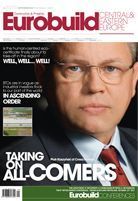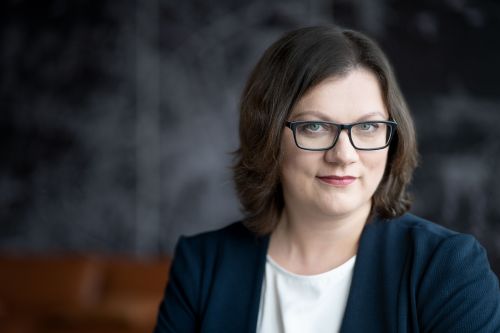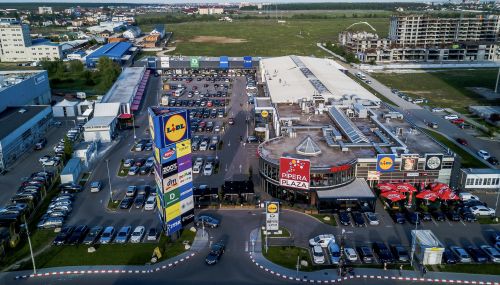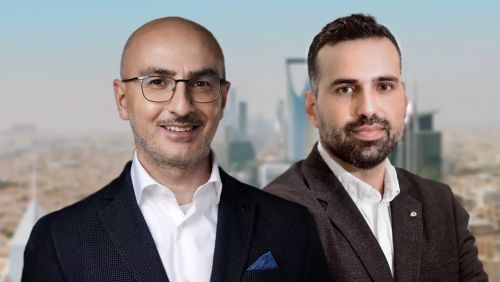Value in Wrocław
Office & mixed-use development
Rafał Ostrowski, ‘Eurobuild Central & Eastern Europe’: Your offices in the Business Garden complex in Wrocław employ 350 people and cover 5,600 sqm. Why did you need so much space?
Sudheer Kaavil Valappil, site director at BD: I have been working in this industry for more than 15 years, and could see the impact of many unhealthy practices first hand – such as employees sitting in front of a computer for eight plus hours a day. We also took a look at the younger generation, who tend to have emerged from a very footloose, university environment and dislike being confined to one place. Hence we wanted to make our offices more modern and spacious to provide what we call flexible working options. Our employees can either sit at their desks or take their laptops to the kitchen or the chill-out zone. Wi-fi is available throughout the campus, so in the summer you can sit on the lawn outside the office and try to work from there. You no longer have to be confined to a particular workspace unless your specific task requires that. Secondly, if you take a few breaks – and you need to because a lot of our work is intellectual work – it should be a very fulfilling break, instead of just running to the kitchen to grab a cup of coffee and coming straight back. So we provide options such as massage chairs, Playstations, a yoga room and sports facilities to enrich the breaks you take. When you come back to your desk, you are then much more refreshed and more able to re-focus on your work.
As I understand it, the BPO/SSC sector is all about lowering costs – but what you are describing here seems more like increasing them, am I right?
Well, yes. If you look at the trends in the sector you can see that more of the predictable tasks are increasingly being automated and many operations are also being moved out to lower cost locations. By re-locating, many companies can achieve one-off benefits in terms of costs, but once this has been absorbed into their businesses the main question is then how to get more value out of the costs you have taken on.
So we decided to approach this differently – by focusing on generating more value from our employee base and balancing the cost. This is why we are providing a highly enabling work environment for our employees to reach their full potential. And furthermore, we are a medical company whose vision is to make a contribution to the field of health. We want our associates to subscribe to both our motto and our mission. In order to achieve this, we wanted to build a truly health focused work environment for our office in Wrocław.
Why did you choose Wrocław?
Five years ago when we started to look at different locations in Europe, we travelled to different cities. We talked to people who had already moved into these cities and found that those who moved here before us to Wrocław had had an excellent experience of the city. It was almost like going to a restaurant based on other people’s reviews – we found that early movers had a high opinion of the city. There is also an excellent pool of students, with the human capital coming from the local universities; the city’s infrastructure was being expanded, including the airport, as well as the road network, and so on. We also saw that the city was a very attractive one for people from elsewhere in Poland to move to. Wrocław is very high on the national ranking of cities where people would like to live. We could see that there was not just local talent, but also talent keen on moving to the city. So, all in all, Wrocław seemed a very inviting place.
But still, in terms of costs it is not the cheapest city. You could probably have gone to a less popular place in the CEE region.
Yes, but the services sector has moved on from purely focusing on costs onto looking at what the right cost is in terms of the value. It is like this in our industry, the medical devices sector. You wouldn’t want to buy the cheapest medical product available, because if a medical tool is going into your body or is being used for surgery on a close relative, you want to make sure that it will be the best quality for the money spent. You go for the value, not just the cost. So in the same way we went to a place where we got the right value for the money we spent.
How long will the premises you have there be sufficient for your needs? Will you have to expand again in five or ten years or even into the longer term?
I would say that the world is evolving in a very, very rapid way. It is very hard to even look three or four years ahead. Around 18 months ago we had 120 employees – now we have 350. We are still adding another 50+ roles to our centres, but I think after our initial sprint we now need to catch our breath and stabilise the operations that have moved to the centres, before we start looking at where else we might move into in Wrocław. The more value the centre gives to BD across the region, the more demand there is for our work. So in the short term we want to increase the value of what we already have moved into in the region. But we will still be looking for more opportunities to help our objectives.
What about the other CEE countries? Are you considering opening in Romania, Bulgaria or elsewhere?
At this stage of our service operations we will be focusing on Poland. At the moment we do not have any plans to look at alternative locations, because we would rather increase the value of our investment in Poland than have a few geographically dispersed sites. This is our strategy.
And what kind of operations do you have in Wrocław?
We assist our customers, we take orders, we process any complaints; we input such data into our central database; we check if there are any payment problems for our vendors; we perform accounting operations; we support our employees around the region as HR services, and so on. We also have a few specialised senior roles supporting quality, automation, analytics, program management, technology, etc.
Which regions do you cover?
Primarily Europe, the Middle East and Africa. Some of our personnel and teams also provide global support.
How difficult it is to communicate in all those different languages from one location in Wrocław?
First of all, we have invested substantially in technology such as video conferencing, internet telephony, high bandwidth net access, etc., to give us easy and regular contact with many parts of the world. We are living in a highly virtual world, so we have to be able to connect to enterprise resource planning (ERP) systems from the centre and, of course, contact people by phone and e-mail.
Secondly, when someone calls BD using a domestic number in a supported country and they are connected to a well-informed person who speaks their language well at the other end of the line, they often can’t even tell whether the person answering the phone is in Poland, France or some other country. Therefore, armed with a combination of technology and the brightest talent, we are able to operate in a healthy, efficient way that respects the country we are providing support services for.
How do you feel Poland is perceived as a shared service location?
I would say it is highly regarded in Europe and in the US. If you look at some other competing countries, such as India, the Philippines, Romania and Hungary, they also hold Poland in high regard, because it has established its reputation as one of the leaders in this sector by moving up the value chain.
And I think this respect has continued to grow over the last five years or so. Many big companies are now receiving good value for their investment in Poland, so this is why their respect for the country has been going from strength to strength.
Banking, finance and supply chain management
Sudheer Kaavil Valappil is the site director of BD’s global shared services centre in Wroclaw, which supports end-to-end supplier, customer and employee services. He has been employed in many roles over his seventeen-year career and has experience in the fields of banking, finance, supply chain management, IT, HR, customer services and sales. Prior to joining BD, between 2001 and 2015 he was employed by Hewlett-Packard in a number of positions including global sales compensation leader for the company’s USD 20 bln enterprise services business. Before 2001 he also worked as a finance executive for ICICI Bank and as a project manager for Stark Group. He holds degrees from Stanford University, the London Business School and the HEC School of Management in Paris.





















































